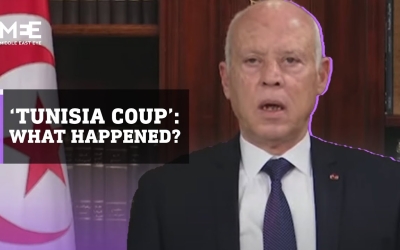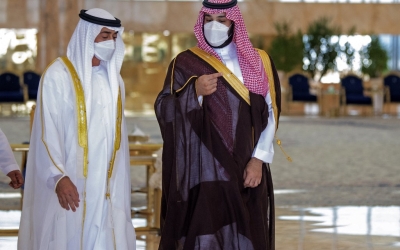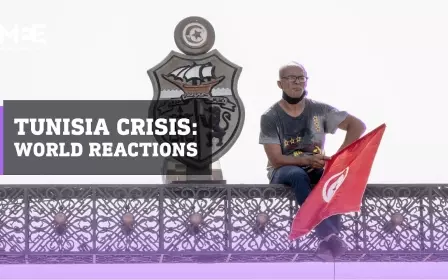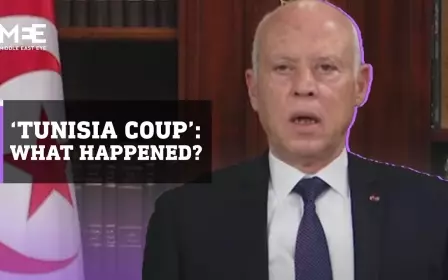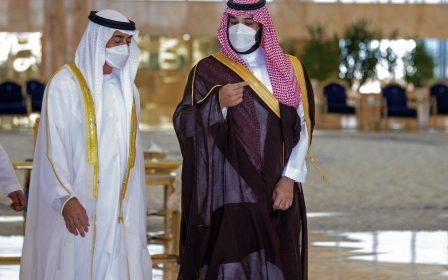Tunisia coup: Judiciary probes Ennahda and two other parties over 'foreign funding'

Tunisia's judiciary has opened an investigation into three political parties, including Ennahda and Heart of Tunisia, on suspicion of receiving foreign funds during the 2019 election campaign, a judicial source has told Reuters.
The investigation was opened on 14 July, before President Kais Saied dismissed the prime minister, froze parliament and rescinded parliamentary immunity for MPs, in a move that both parties branded as a coup.
Tunisia's judiciary spoke out on Monday following Saied's move, insisting it remained independent.
Ennahda and media mogul Nabil Karoui's Heart of Tunisia are the two largest parties in the deeply fragmented parliament elected in September 2019.
The other party under investigation is the smaller Ayich Tounes, founded in April 2018 by Olfa Terras, an entrepreneur known for her philanthropy.
Ennahda leader Rached Ghannouchi, the parliament speaker, and Karoui were opponents of Saied in a separate presidential election that took place over two rounds in September and October of 2019.
Karoui, who owns a big private television station, also faces a long-running investigation into other accusations of financial offences that led to his remand in custody during much of the 2019 election campaign and again this year.
MP Saida Ounissi, a member of Ennahda, said her party received the conclusions of the report of the Court of Auditors on the financing of political parties "a while ago".
'I think that President Kais Saied and his supporters announced this today because they need to announce things that will seem popular in the public’s opinion; the risk is that all of this could become a show trial'
- Saida Ounissi, Ennahda MP
"I think that President Kais Saied and his supporters announced this today because they need to announce things that will seem popular in the public’s opinion; the risk is that all of this could become a show trial," she told Middle East Eye.
"I’m not worried by this announcement per se. The only thing that worries me is that if the situation doesn’t become clearer, if there are no independent judges or an independent prosecutor who isn’t under the control of the president of the republic, then all this could be used as a pretext to set up an authoritarian regime.
"We are mostly worried by the prolongation of this exceptional situation that is illegal and unconstitutional," she added.
MP's house raided
On Tuesday, Tunisian security forces raided the home of MP Rached Khiari, according to a post on his Facebook page. The lawmaker was not at home at the time of the raid.
Khiari sparked controversy in Tunisia in April when he published a video clip on his Facebook page accusing President Saied of receiving foreign support and funding to enhance his chances of winning the 2019 presidential elections.
Khiari claimed that he possessed documents and videos showing Saied had received $5m through his campaign manager, Fawzi Al-Daas, from an intelligence officer working at the US embassy in Paris.
The US embassy in Tunisia denied Khiari’s claims, while Daas submitted a judicial complaint against him.
Khiari is aligned with the Islamist movement Karama, which is part of the country's suspended governing coalition that includes the Ennahda party.
The MP had since been facing a lawsuit and an arrest warrant by a military court but he had been shielded from arrest by parliamentary immunity.
Saied, an independent, campaigned in 2019 as a new broom against what he painted as a corrupt, stagnant political elite focused on its own narrow interests and responsible for a decline in Tunisian living standards after the 2011 revolution.
On Sunday, he said he had rescinded parliamentary immunity in order to subject corrupt parliamentarians to the law “despite their wealth and positions”.
Middle East Eye propose une couverture et une analyse indépendantes et incomparables du Moyen-Orient, de l’Afrique du Nord et d’autres régions du monde. Pour en savoir plus sur la reprise de ce contenu et les frais qui s’appliquent, veuillez remplir ce formulaire [en anglais]. Pour en savoir plus sur MEE, cliquez ici [en anglais].


